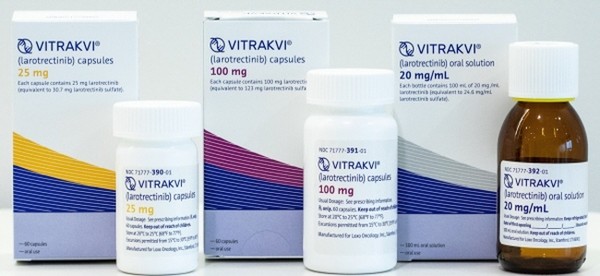Bayer said its Vitrakvi (ingredient: larotrectinib), an oral selective tropomyosin receptor kinase (TRK) inhibitor, extended response duration and survival in neurotrophic tyrosine receptor kinase (NTRK) gene fusion-positive lung cancer patients.
The latest data showed that Vitrakvi could target NTRK fusion in lung cancer treatment, the company said.
Bayer presented the latest data of Vitrakvi’s benefit in response duration and survival extension in NTFK gene fusion lung cancer patients at the European Lung Cancer Virtual Congress 2021 on March 25-27.

Vitrakvi is a TRK inhibitor indicated for treating adult and pediatric patients with solid tumors that have an NTRK gene fusion without acquired resistance mutation.
NTRK gene fusion is found in rare cancer, including secretory carcinomas such as breast cancer or salivary gland cancer, and infant fibrosarcoma. It is also a rare cancer-causing factor in common carcinomas such as melanoma, glioma, thyroid cancer, lung cancer, and rectal cancer.
The latest released data is the results of the analysis on 14 NTRK gene fusion lung cancer patients in two trials, involving objective response rate (ORR), progression-free survival (PFS), and overall survival (OS).
Half of the total 14 lung cancer patients had central nervous system (CNS) metastasis at the beginning of the study, and the patients had an average of three treatments, so most of them were at the end stage of treatment. The patients did not have EGFR, KRAS, BRAF, and ALK, which are oncogenic drivers commonly found in lung cancer at baseline.
As of July 15, 2019, when data collection was completed, patients who received 100mg Vitrakvi twice a day recorded 71 percent in ORR.
The PFS at 12 months was 69 percent, and OS, 91 percent. The two have yet reached the median, and 88 percent of the patients maintained the treatment response.
Also, seven Vitrakvi-treated patients who had CNS metastasis had 57 percent ORR. Vitrakvi’s treatment-related adverse reactions were grades 1 to 2, which showed the drug’s good tolerability, Bayer said.
Victor Moreno Garcia, at START Madrid-FJD Hospital in Madrid, Spain, who led the study, said the latest analysis included new genomic data supporting that NTRK gene fusion was a primary oncogenic driver.
“Vitrakvi has once again confirmed the good tolerability, high response rate, response duration, and prolonged survival in patients with brain metastasis and advanced lung cancer with NTRK gene fusion,” he said.
Moreno Garcia noted that the PFS and OS shown in the small sample group of NTRK gene fusion lung cancer patients were higher than those who received the standard of care.
By demonstrating that a therapy targeting a tumor growth factor can improve clinical outcomes, the study showed that it was important to run timely genetic testing to identify patients with genetic mutations early, he added.

